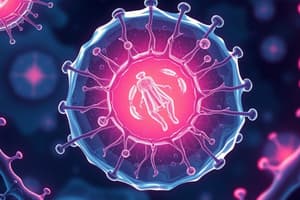Podcast
Questions and Answers
Which of these cells carries oxygen throughout the body?
Which of these cells carries oxygen throughout the body?
- Muscle Cells
- Red Blood Cells (correct)
- Sperm Cells
- White Blood Cells
What is the function of White Blood Cells?
What is the function of White Blood Cells?
Plays important role in immune system
The ______ cell fertilizes an egg cell to make a baby.
The ______ cell fertilizes an egg cell to make a baby.
Sperm
Egg cells can be fertilized by more than one sperm.
Egg cells can be fertilized by more than one sperm.
What are the adaptations of a Nerve Cell?
What are the adaptations of a Nerve Cell?
Which type of cell is elongated and elastic to facilitate movement?
Which type of cell is elongated and elastic to facilitate movement?
What is the process by which generic cells become specialized for a particular function called?
What is the process by which generic cells become specialized for a particular function called?
What is the main function of red blood cells?
What is the main function of red blood cells?
What unique feature allows sperm cells to fertilize an egg cell?
What unique feature allows sperm cells to fertilize an egg cell?
Egg cells can be fertilized by more than one sperm cell.
Egg cells can be fertilized by more than one sperm cell.
Which cell plays an important role in the immune system?
Which cell plays an important role in the immune system?
What is a key adaptation of muscle cells?
What is a key adaptation of muscle cells?
What structural feature do nerve cells have that aids in their function?
What structural feature do nerve cells have that aids in their function?
Flashcards are hidden until you start studying
Study Notes
Cell Differentiation Overview
- Cell specialization, or differentiation, transforms generic cells into specialized cells for specific functions.
Cell Specialization in Animals
-
Red Blood Cells
- Primary function: O2 transport throughout the body.
- Adaptations: Lack of nucleus for more space, biconcave shape enhances surface area, contains hemoglobin for oxygen binding.
-
White Blood Cells
- Key role: Integral part of the immune system.
- Adaptations: Irregular shape allows flexibility, capable of producing antibodies and antitoxins for defense against pathogens.
-
Sperm Cell
- Function: Fertilizes an egg to initiate reproduction.
- Adaptations: Long tail enables motility, contains numerous mitochondria for energy, has specialized chemicals at the head to assist in penetrating the egg.
-
Egg Cell
- Function: Serves as a carrier of genetic material.
- Adaptations: Large size aids nutrient storage, membrane undergoes chemical change post-fertilization to block additional sperm entry.
-
Nerve Cell (Neuron)
- Function: Transmits nerve impulses throughout the body.
- Adaptations: Long, thin axon facilitates signal transmission, branching dendrites for connection with other cells, myelination speeds up signal conduction.
-
Muscle Cell
- Function: Enables movement in the body.
- Adaptations: Elongated structure allows contraction, elastic properties help maintain shape, contains numerous mitochondria for energy during activity.
Cell Differentiation Overview
- Cell specialization, or differentiation, transforms generic cells into specialized cells for specific functions.
Cell Specialization in Animals
-
Red Blood Cells
- Primary function: O2 transport throughout the body.
- Adaptations: Lack of nucleus for more space, biconcave shape enhances surface area, contains hemoglobin for oxygen binding.
-
White Blood Cells
- Key role: Integral part of the immune system.
- Adaptations: Irregular shape allows flexibility, capable of producing antibodies and antitoxins for defense against pathogens.
-
Sperm Cell
- Function: Fertilizes an egg to initiate reproduction.
- Adaptations: Long tail enables motility, contains numerous mitochondria for energy, has specialized chemicals at the head to assist in penetrating the egg.
-
Egg Cell
- Function: Serves as a carrier of genetic material.
- Adaptations: Large size aids nutrient storage, membrane undergoes chemical change post-fertilization to block additional sperm entry.
-
Nerve Cell (Neuron)
- Function: Transmits nerve impulses throughout the body.
- Adaptations: Long, thin axon facilitates signal transmission, branching dendrites for connection with other cells, myelination speeds up signal conduction.
-
Muscle Cell
- Function: Enables movement in the body.
- Adaptations: Elongated structure allows contraction, elastic properties help maintain shape, contains numerous mitochondria for energy during activity.
Studying That Suits You
Use AI to generate personalized quizzes and flashcards to suit your learning preferences.




